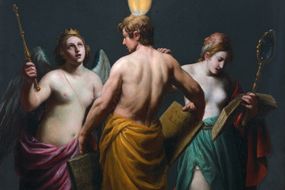From 30 April to 29 September 2025
A golden thread connects historical and artistic events, diplomatic balances, and devotion in the Mediterranean along the route between Venice and Crete, Candia from the 13th century, the pearl of the Serenissima's Overseas State.
The painted gold, which illuminates the icons with spiritual light, is the protagonist of the exhibition at Palazzo Ducale curated by the Scientific Director of the Civic Museums Foundation Chiara Squarcina, by the head of the Correr Museum Andrea Bellieni, and by the General Director of the Byzantine and Christian Museum of Athens Katerina Dellaporta; it serves as a backdrop to a long history of intense pictorial relationships between two islands.
After the Fall of Constantinople (1453), Candia became the most important artistic center for the ancient Byzantine tradition, faithfully followed by over a hundred workshops of "madoneri", especially authors of popular devotional images. At the same time, Venice - like a new Byzantium - saw the arrival of an increasing number of works and artists from the Aegean island: "icon painters" traveling or immigrating between Crete, the Ionian islands, and the capital. The result was the encounter and original synthesis between the native Byzantine courtly imprint - already one of the essential souls of the Venetian tradition itself - and the Western figurative language, first late Gothic, then Renaissance, human-centered, naturalistic, and lively.
A fortunate relationship intertwines without ever being exhausted, from the golden Venetian Renaissance between the Fourteenth and Fifteenth centuries, until the threshold of the Nineteenth century, with moments of always original symbiosis. The exhibition aims to represent a precious and so far rare opportunity in Italy for a reinterpretation and in-depth study of a cultural phenomenon that was very relevant and still little investigated.
The seven sections of the exhibition chronologically mark and illustrate this unique pictorial journey: from the origins in the fifteenth century, with the first masters progressively looking towards Western Gothic - among them Angelos, Akotantos, and Andreas Ritzos - to the mature fifteenth century with significant affinities with the models of the great Venetian Renaissance - especially those of the Bellini and Vivarini - in painters like Ioannis Permeniatis.
The evolution continues in the sixteenth century with successful hybridizations between the Byzantine tradition and free Western inspirations, mainly mediated by printed images, with prolific and renowned masters such as Georgios Klontzas and Michael Damaskinos; the latter important for the long period of activity spent in Venice between the 1570s and 1580s.

Piazza San Marco, 1, Venice, Italy
Opening hours
| opens - closes | last entry | |
| monday | 09:00 - 19:00 | |
| tuesday | 09:00 - 19:00 | |
| wednesday | 09:00 - 19:00 | |
| thursday | 09:00 - 19:00 | |
| friday | 09:00 - 19:00 | |
| saturday | 09:00 - 19:00 | |
| sunday | 09:00 - 19:00 |

From 10 October to 6 January 2026
ART AND NATURE

Carrara Academy, Bergamo

Artsupp Card: museum + exhibitions 13.00 €